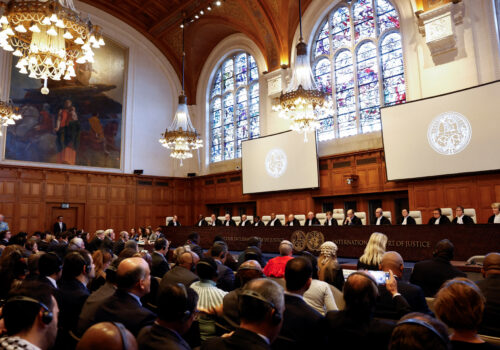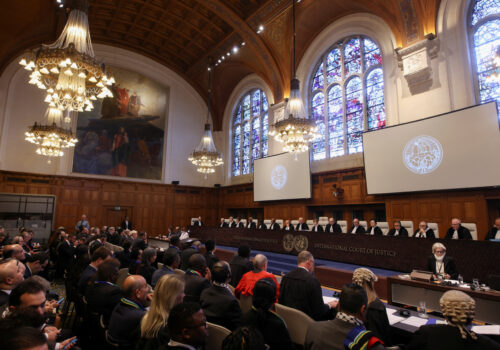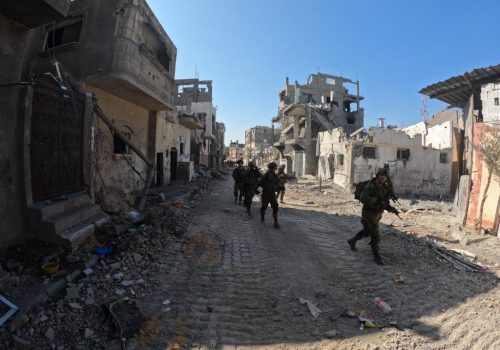What just happened in the genocide case against Israel?
JUST IN
To be continued. The International Court of Justice (ICJ) on Friday ruled that South Africa’s genocide case against Israel will proceed, and ordered Israel to limit harm to Palestinians as it continues its war against Hamas in Gaza. But the court did not call for a cease-fire, as South Africa had requested. What is the practical effect of the preliminary ruling, and what’s next in the courtroom and on the battlefield? Atlantic Council experts are on the case.
TODAY’S EXPERT REACTION COURTESY OF
- Elise Baker (@elise__baker): Senior staff lawyer at the Strategic Litigation Project
- Thomas S. Warrick (@TomWarrickAC): Nonresident senior fellow in the Scowcroft Middle East Security Initiative and former senior official in the US departments of State and Homeland Security
- Shalom Lipner (@shalomlipner): Jerusalem-based nonresident senior fellow in the Middle East programs and former advisor to seven Israeli prime ministers
- Gissou Nia (@GissouNia): Director of the Strategic Litigation Project
Why it matters?
- While the court did not call for a cease-fire, it did find South Africa’s claims of genocide plausible and accordingly ordered Israel to “do everything within its power to prevent genocidal acts against Gazans” and “take concrete actions to ease what the court found to be a ‘catastrophic humanitarian situation’ and restore conditions that can support life in Gaza, not risk its destruction,” Elise tells us.
- Those concrete actions, Elise adds, should include Israel allowing more humanitarian aid, limiting its military operations to facilitate that aid, and halting its telecommunications blackouts in Gaza.
- In Tom’s view, the ICJ merely asserted that Israel must follow Genocide Convention rules to which it has already committed. The decision is “an important blow to the argument advanced by Israel’s critics that death and destruction in Gaza are sufficient to establish a violation of the Genocide Convention.”
- But Gissou notes that a close read of the order has led many experts to argue that “implementing these provisional measures is impossible without cessation of kinetic activity” and thereby the court may essentially be ordering a cease-fire without expressly calling for one.
Battlefield realities
- In Israel, leaders likely “breathed a sigh of relative relief,” Shalom tells us, that the court didn’t order a cease-fire. He says the decision is “unlikely to compel any drastic reconfiguration of Israel’s war deployment or narrative.”
- That’s in part because in Israel’s view, it is already taking all measures within its power to protect Palestinians and provide them aid, Shalom says, “despite the complex circumstances of fighting a terrorist group embedded among a civilian population.”
- In the legal battle, Tom says that South Africa “will now have to establish an intent to destroy Palestinians in Gaza in whole or in substantial part—not by inference alone, but by proof of actual intent.” This is “likely to fail,” he adds, when the court decides on the merits in the coming years.
Eye on Washington
- Given Prime Minister Benjamin Netanyahu’s comments that Israel will settle for nothing less than “absolute victory,” Gissou says that “the hope will lie with” outside countries “to recognize the gravity of the ICJ order and to urge compliance.”
- The outside country with the most leverage is the United States. Gissou predicts that “the US government may use the explicit lack of a cease-fire order as political cover,” claiming that it has met the ICJ’s ruling by helping humanitarian assistance reach Gazans.
- “Concerned governments and advocates should push back on any such cynical framing,” she adds.
Further reading
Fri, Jan 26, 2024
Experts react: What the International Court of Justice said (and didn’t say) in the genocide case against Israel
New Atlanticist By
South Africa asked the court to order an immediate cease-fire. Israel asked the court to throw out the case. Atlantic Council experts explain what the court did instead.
Fri, Jan 12, 2024
Five questions and answers about South Africa’s genocide case against Israel
New Atlanticist By Lisandra Novo
A former judicial fellow at the ICJ explains what you need to know about the case and what to expect going forward.
Tue, Oct 31, 2023
Israel claims it is no longer occupying the Gaza Strip. What does international law say?
MENASource By Celeste Kmiotek
The laws of occupation codify a basic principle of humanity: those with effective control over a population have obligations to protect it.
Image: Judges at the International Court of Justice (ICJ) rule on emergency measures against Israel following accusations by South Africa that the Israeli military operation in Gaza is a state-led genocide, in The Hague, Netherlands, January 26, 2024. REUTERS/Piroschka van de Wouw


